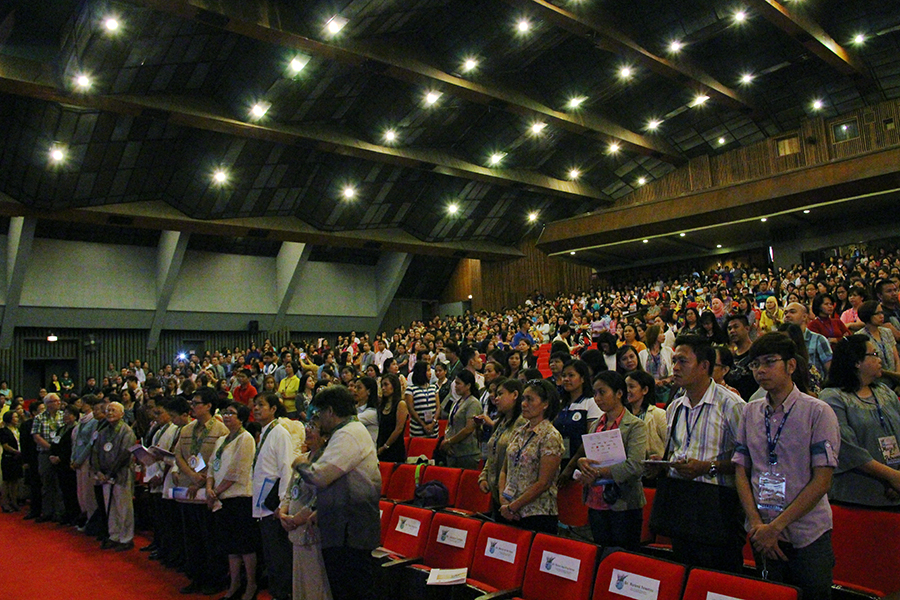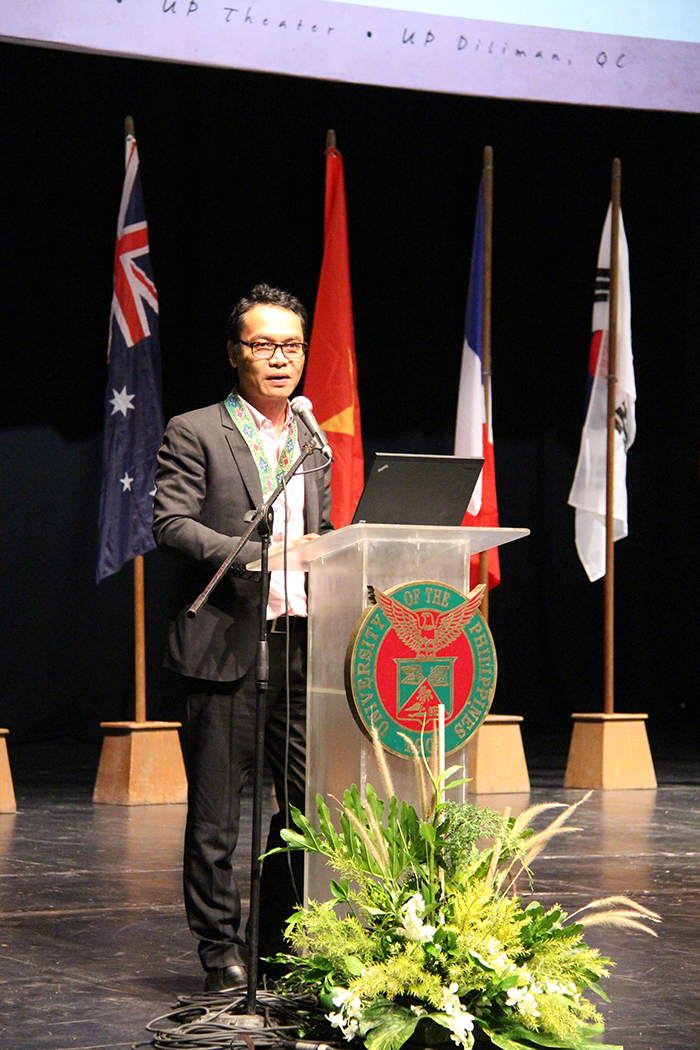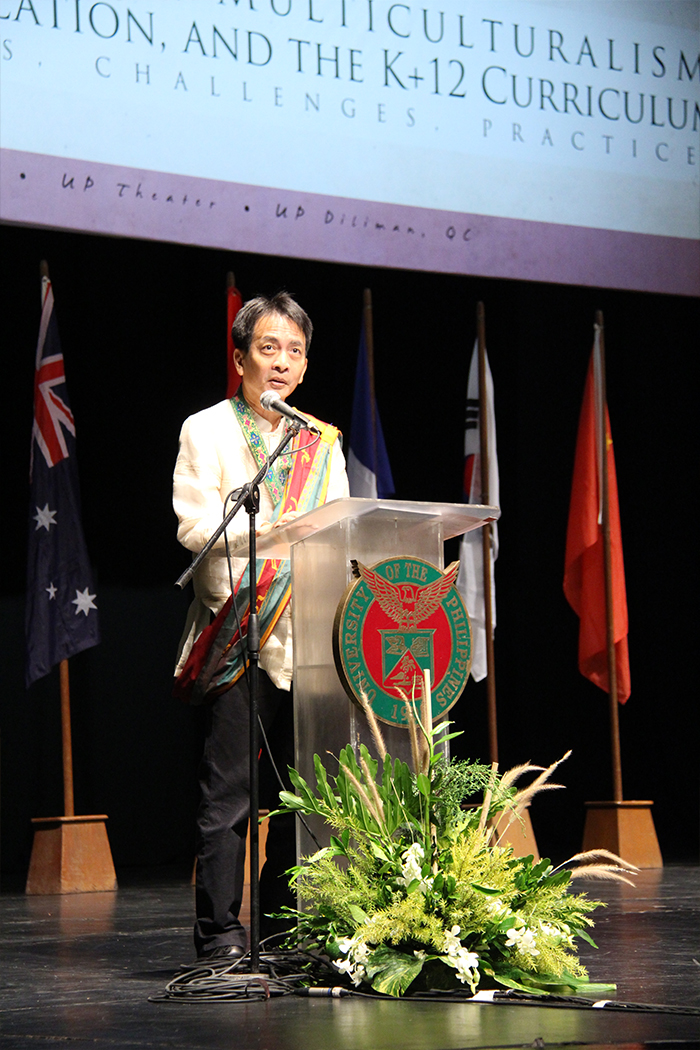
By Haidee C. Pineda
(DEC. 4)—Over 1,000 language educators across the globe were at UP Diliman (UPD) from Nov. 20-22 to participate in the international conference “Mother Tongue and National Language in the K+12 Curricular Enhancement as Framework for Development: An International Conference-Workshop.”
Experts from Australia, China, France, Hawaii, Indonesia, the Philippines, Russia, South Korea, Thailand and Vietnam discussed trends, issues, challenges and best practices on language, multiculturalism, multilingual education and the K+12 curriculum “in the context of radical education reforms in the country, the ASEAN Integration 2015 and Globalization.” The 3-day meet held at the University Theater saw more than 100 academic papers presented.
Conference Plenary speakers included Dr. Elena Frolova of Moscow State University, Russia; Dr. Rowena Cristina L. Guevara, executive director of the Department of Science and Technology; Dr. Elisabeth Luquin of Institut National Des Langue Civilisations Orientales, (INALCO), Paris, France; Dr. Hyun Sik Min, director-general of the National Language Institute, South Korea; Dr. Rosalinda J. Villaneza, head of the Department of Education (DepEd) National Office Curriculum Development Division; Dr. Alan Williams, chairperson of the Language and Literacy Education of the University of Melbourne, Australia; and Dr. Luo Xuanmin of Tsinghua University, China and Routledge Board of Translation Editor.

Sustainable Unit chief
Dr. Danilo Padilla, UNESCO Bangkok Education for Sustainable Unit chief, said “UNESCO placed great importance in language as the key to inclusion. It is at the center of human activities, self expression and identity, and recognizing the primary importance that people place in their own language, fosters the kind of true participation in development that achieves lasting results.”
He further said the protection and promotion of mother languages are keys to global citizenship and authentic mutual understanding. “They hope to ensure that rare and indigenous knowledge is safeguarded and handed down. Understanding and speaking more than one language leads to a greater understanding of the wealth of cultural interaction in our world as well, recognizing local languages enables more people to make their voices heard and take an active part in their collective space.”
Touching on UNESCO’s mother tongue-based multilingual education (MTBMLE) program, Padilla explained this starts by using the child’s mother tongue as first language. The child then is taught his or her second even third language as he/she progresses through education. “It allows time for students to develop competence, confidence and creativity in oral and written first language before moving to the second language,” he said.

The UNESCO unit chief said “With the MLE (multilingual education) program, children begin to construct a strong educational foundation which will lead to better academic performance and decrease repetition and dropout rate. MLE program not only supports maintaining children’s own language but also helping children learn additional languages successfully.”
UPD Chancellor Michael L. Tan in welcoming the participants said he was hopeful the conference presentations that cut across disciplines will encourage more people to support multilingualism and multiculturalism.
“I hope, too, that the multicultural encounters during this conference will encourage us to develop an ear for appreciating each other’s…homonyms, syntaxes, and phoneme and accents. To better appreciate multiculturalism, let us combine that ear with open minds and hearts and we exchange our narratives and stories to uplift the human spirit, or as we would say in Filipino, nakakataba ng puso,” he said.
Also on hand to welcome participants were UP Assistant Vice President for Public Affairs Jose Wendell P. Capili representing UP President Alfredo E. Pascual, National Artist for Literature Bienvenido Lumbera and representatives of Br. Dennis Magbanua, De La Salle University (DLSU) officer-in-charge; Rev. Herminio V. Dagohoy, University of Sto. Tomas (UST) Rector; Commission on Higher Education Chairperson Patricia B. Licuanan, and Dr. Oscar P. Ferrer, Guro Formation Forum, Inc. (GFFI) president. There were also video messages from National Artist for Literature and Komisyon ng Wikang Filipino chairperson Virgilio S. Almario and ACT Teachers Party-list Representative Antonio L. Tinio.
The conference was organized by the Department of Filipino of the three universities: UPD, DLSU and UST, and in cooperation with the Guro Formation Forum, Inc. (GFFI). Dr. Ma. Crisanta N. Flores was master of ceremonies and conference director.— Images courtesy of the UP System Information Office
